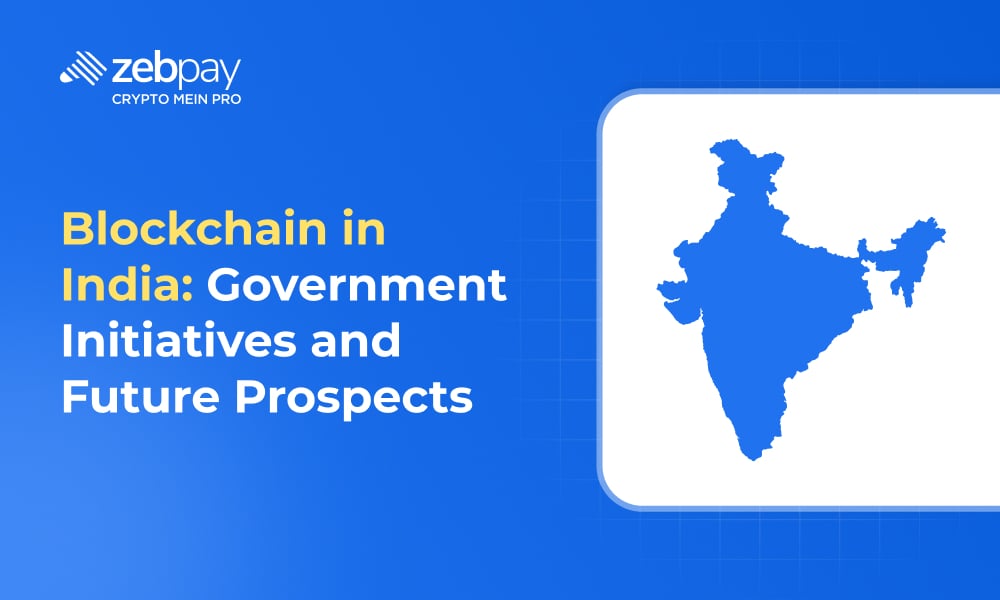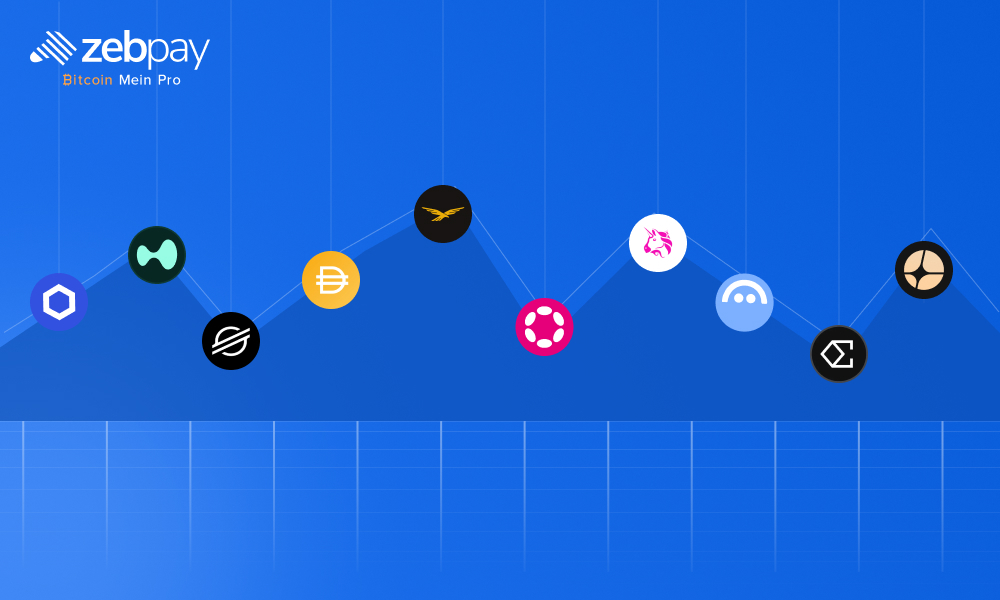In this era of technological revolution, blockchain has emerged as a leading force, poised to make a difference. While arguments still exist around the technology’s early-stage development, India is forging ahead and making strides to stay at the forefront of innovation. Across the digital landscape, different companies are tinkering with the technology to bring the ‘decentralised’ factor to their mechanisms, all in pursuit of a better tomorrow. According to a white paper, unveiled at the ‘Entrepreneur Web3 Summit’ in Bengaluru, the Indian blockchain market is anticipated to grow from $0.28 billion in 2019 to $4.3 billion by 2025, having a 47.3% CAGR.
Introduction to Blockchain Technology and Its Importance
Often heralded as one of the transformative innovations of the 21st century, blockchain technology fundamentally changes how data is stored, shared, and secured. At its core, blockchain is a digital ledger that circuits manually, recording transactions across multiple computers to ensure data is secure, transparent, and immutable. Moreover, blockchain works across peer-to-peer network communication, eliminating the risks of fraud and manipulation.
The importance of technology extends beyond its initial use in crypto assets like Bitcoin (BTC). Its decentralised nature helps tackle challenges that businesses face today, regarding data security, transparency, and reliability. Additionally, blockchain is vital for new technologies and business models such as decentralised finance (DeFi), non-fungible tokens (NFTs), and smart contracts, which are paving the way for digital ownership, financial inclusion, and automation.
Indian Government’s Blockchain Initiatives
| Blockchain initiative | Theme |
| Maharashtra Blockchain Sandbox | Focus on blockchain-backed applications for e-governance, with emphasis on supply-chain management, land registry, and public record-keeping. |
| Andhra Pradesh Land Registry | For ensuring land records management through digitisation. |
| Telangana Blockchain Initiatives | Through establishment of a Blockchain District in Hyderabad, the projects devise blockchain solutions for public administration. |
| IndiaChain | Under the Digital India initiative, the project highlights blockchain’s usage for different areas of governance. |
| Central Bank Digital Currency (CBDC) by RBI | ‘Digital’ version of the Indian Rupee. |
| Ministry of Electronics and Information Technology (MeitY) initiatives | For creation of a blockchain framework to help with blockchain’s adoption in different areas. |
| Election Commission of India | For securing voting systems through security and transparency of the electoral process. |
| Bankchain Consortium | To enhance security and diminish frauds related to banking operations. |
Blockchain for E-Governance: Maharashtra’s Blockchain Sandbox
To ensure the inculcation of blockchain applications into government services, Maharashtra’s government introduced a Blockchain Sandbox for e-governance. Being overseen by the Maharashtra Information Technology Directorate, the Blockchain Sandbox initiative was launched with an initial budget worth Rs 10 crore (about $1.4 million) for FY 2019-20, of which Rs 4 crore was directed towards ensuring blockchain technology’s adoption.
From what it’s understood, the sandbox helps experiment with blockchain-oriented solutions, with the collective aim to benefit government platforms, developers, and startups. This framework has been designed to encourage innovation and facilitate the testing of compliant blockchain projects in a secure, controlled environment. Official reports suggest that the pilot blockchain projects happened in key sectors such as supply-chain management, document verification, healthcare, and SSC certification.
Read more: How Blockchain in Healthcare is Making a Change
IndiaChain: India’s National Blockchain Infrastructure
IndiaChain is conceptualised as the country’s national blockchain infrastructure, designed to transform how government services are delivered and increase transparency across sectors. As part of the broader Digital India initiative, IndiaChain aims to create a unified blockchain infrastructure for utilisation by various government sectors, on account of public services:
- Unified Blockchain Network: To develop a unified blockchain framework for extending support to different government facilities.
- Enhancing Transparency and Reducing Corruption: For creating public trust in government mechanisms through transparency of transactions.
- Streamlining Subsidy Distribution and Welfare Programs: To establish an efficient and accountable structure for providing government subsidies and other welfare benefits.
- Promoting Digital Identity and Secure Transactions: Using a unified blockchain-oriented identity system, the infrastructure grows digital identity security and eases the availability of government services.
- Supporting Economic Growth: Enhancing security and efficiency around digital transactions to encourage economic growth.
Future Prospects of Blockchain in India
| Financial Services Revolution | Increased blockchain adoption by banks and financial institutions. |
| Enhanced E-Governance | Development of more streamlined, secure, and corruption-free public services. |
| Supply-chain Management | Ensuring enhanced efficiency and trust amongst different industries. |
| Digital Identity and Authentication | A decentralised infrastructure for private data protection. |
| Innovation and Startups | Blockchain startups could drive technological advancements. |
Challenges and Opportunities in Blockchain Adoption
| Challenges | Opportunities |
| Scalability Problems | Enhanced Transparency and Security |
| Regulatory Clarity | Streamlining Operations and Reducing Costs |
| Increased Energy Consumption | Financial Inclusion |
| Skill and Knowledge Gap | Improved Supply-chain Management |
The Role of Private Sector in Indian Blockchain Development
- Driving Innovation and Research: This includes the development of applications for different sectors such as finance, healthcare, supply chain, and logistics.
- Blockchain Startups and Entrepreneurial Ecosystem: Apart from driving technological innovation, these platforms are responsible for the development of new business models and attracting investments.
- Collaboration with Government Initiatives: Through partnerships with government entities, the private sector is creating a regulatory framework around blockchain technology.
Read more: What Are Blockchain Layers
Global Comparisons: How India’s Blockchain Strategy Stacks Up
| Regulatory Landscape | While India is proceeding towards creating a regulatory environment, it’s still behind countries such as Switzerland and Singapore, which have established more blockchain-friendly regulatory standards. |
| Government Initiatives | India’s government-led blockchain initiatives are promising but still in the testing phase, while countries like Estonia and the UAE have already deployed large-scale blockchain applications. |
| Private Sector Engagement | Despite India’s private sector helping with blockchain development, it still has space for increased collaborations and investments. |
| Blockchain Talent and Education | Focus lies on enhancing India’s blockchain education programs to meet global standards. |
| Blockchain Adoption and Innovation | Through scaling successful blockchain pilots, more private sector investment, and focus on development of blockchain-based regulations. |
Conclusion
India’s blockchain journey is marked by key government and private sector players, positioning the country as a potential leader in the digital transformation journey. Despite challenges such as the need for regulatory clarity and skills gap, the future has opportunities for blockchain to drive economic growth, increase awareness, and drive innovation across industries, thus, leading India towards a decentralised tomorrow.
ZebPay blogs serve as a great source of knowledge for all things crypto-related. Click the button below and join the millions trading on ZebPay.











